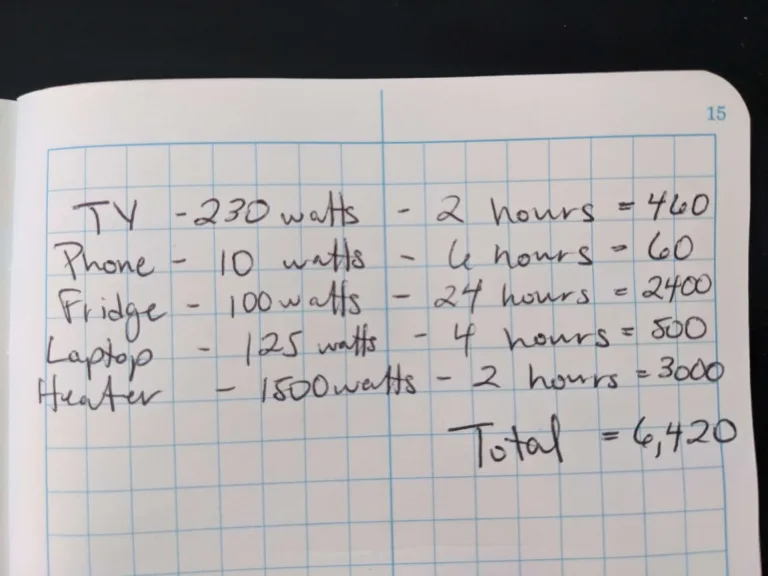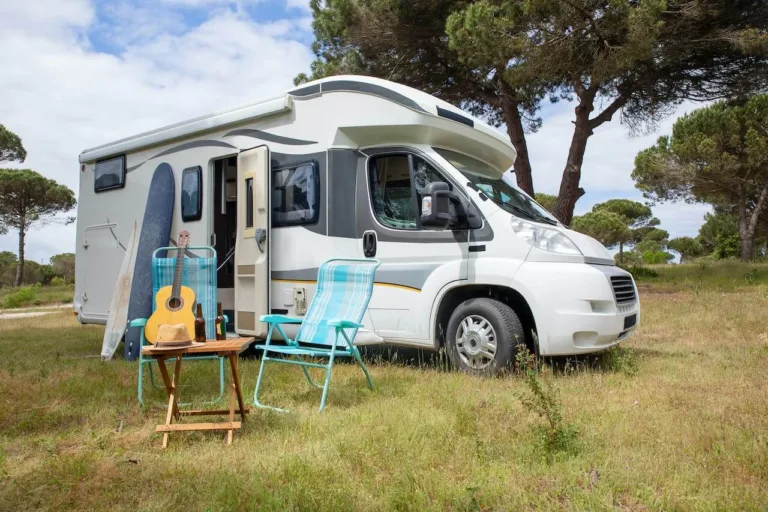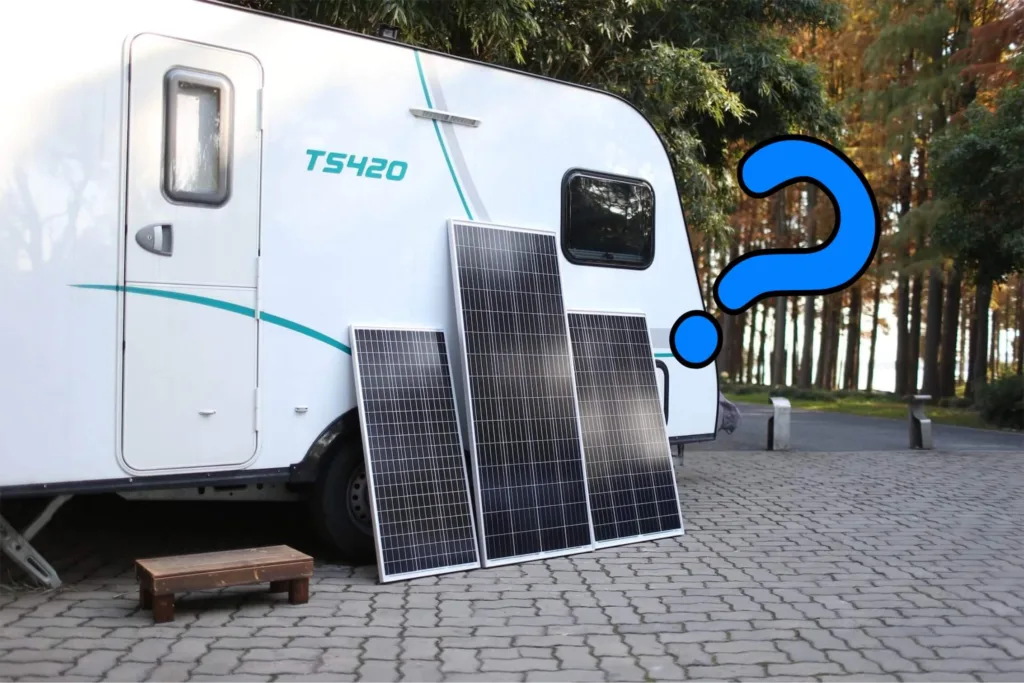How many solar panels do I need for my RV? Good question!
The number of solar panels you need is dependent on how much energy you use, how big those panels are, and how much sun those panels get.
But there are a few other questions to answer. Like are you living in your RV or glamping? Are you on-grid or off-grid? Are you dependent on electricity for heat?
We help you answer all of these questions below. But first… Check out our RV Solar Calculator below, to get a good estimate of where to start.
How Many Solar Panels Do I Need for My RV?
The answer is unfortunately variable. But if you used our calculator above, then you already know that the answer depends on 3 things:
- How many watts do you use?
- How much sunlight will you average?
- The size of the panel you plan to use.
1. How Many Watts Does My RV Use?
First off, I am assuming you are just looking to use these panels for daily operations. Things like running a fridge, some heating or cooling, a television… If that sounds like your needs then read on!
But if you have a fully electric RV that you are trying to move with solar panels… I think you might be forging your own trail and I am not sure anyone has the answers you need at this time.
How to Determine Watts Used
You have four options for figuring out how many watts you will use.
To not waste your time, figure out which of these options fits you best. Then scroll down to the corresponding option below to find out a few more details.
- Option 1 – You are hooked up to utilities and get monthly bills.
- Option 2 – You are RV camping and need an estimate.
- Option 3 – You are techy and want to use an energy monitor.
Option 1: Utility Bills
Good news! This is the easiest and most accurate option for figuring out your usage.
Simply go to your energy bill and find the kWh you use per year. If your bill doesn’t show this information then you will have to look at each month and add them together for a total.
Now let’s do some math! < If that statement made you feel sick to your stomach… Don’t worry, we will walk you through it.
Take your kWh for the year, multiply by 1000, then divide by 365.
Watts = kWh * 1000 / 365
Option 2: Rough Estimate

For an estimation, write down the devices you think you will use constantly. Then beside the devices, write down the amount of hours you plan to use these devices each day.
Now you have two options. For a more accurate estimate, go look at the watts used for each of the items. The watts are usually on a little sticker on the back or bottom of the device. It will say something like “180W”.
For an estimate, google some averages for devices. Here are some examples of typical items that you may wish to run using your solar system:
- 10 W - Phone Charger
- 100 W - Mini Fridge
- 125 W - Laptop
- 230 W - Television
- 250 W - Crockpot
- 1500 W - Space Heater
Now, for each device multiply your watts x hours… then add all the devices together for a total. An example is shown in the image above.
As a general rule; movement (e.g. fans) and light require less electricity, and heat requires more electricity. So if you are looking to heat the space, you still may want to look into a safe fuel source to save on the number of panels you need.
Option 3: Energy Monitor

If you are looking for something really accurate then consider an energy monitor. These little boxes hook up to the main outlets of your electrical panel and keep a log of all your usage and solar production. They can also tell you the amount of watts that each device uses.
2. Hours of Sunlight Per day
Solar panels are dependent on sun. So logically to answer the question “how many solar panels do I need for my RV” you have to know the hours of sun you will average per day. This has two answers:
If you are living in your RV:
If you are living in your RV, then this answer can be complicated. You are either on-grid or off-grid.
On-grid: If you are on-grid, you may be able to “net-meter”. Net-metering means you can sell your power back to the grid when overproducing. When you are underproducing, you have credits to get energy back for free.
If you are on-grid, call your energy provider and ask them if they have a net-metering program for solar.
If they say yes, then you only need to calculate the average amount of sun you get per day. To do this, Google “average hours of daily sun” + the name of the biggest city near your location. You can just use the average because of your ability to sell back to the grid.
Off-grid: If you are off-grid, then you may want to plan for the months of the year when you get the least sun. This means, either hooking your batteries to your RV to charge your batteries using the engine… using the minimum amount of sun you will get per day during your calculations.
If you are a glamper:
If you are using your RV for occasional glamping, then google “hours of sun” + your location + the month you will use your RV most.
Or you can go to this site and enter your location: https://www.timeanddate.com/sun/

3. What Size Solar Panel?
What Wattttt… Dad joke…
The solar panel size you should use is mostly dependent on the space you have available. Generally, you want to use the biggest watt you can fit, because larger panel sizes are more efficient per area.
The typical sizes are 450W, 400W, 200W, and 100W. Check out the articles below to understand more about potential options, sizes, and uses. But if you can fit 400W then use 400W.
Additional Resources
Frequently asked questions for "how many solar panels do I need for my RV?"
How many solar panels do I need to run a fridge?
A full sized fridge will use around 4000 watts per day. A minifridge will use around 520 watts per day.
So it’s likely that you will only need 1 solar panel to run your fridge, but it depends on the fridge size, hours of sunlight, and size of the panel.
Throw some numbers into the calculator at the top of this article to help you find out an accurate estimate.
How many solar panels do I need in Canada?
Unfortunately, you are going to have to do some calculations using the calculator at the top. But here is the key thing to know about RVing in Canada.
Canada has larger fluctuations in daily sun between summer and winter because of it’s northern location. This means that you really need to think about whether your will be on-grid or off-grid, what months you will be RVing, and you may want to supplement heating using a fuel source to drop your electricity use.
Remember, heat uses more electricity than movement (e.g., fans) or lights. So a heater may be a big energy suck.
